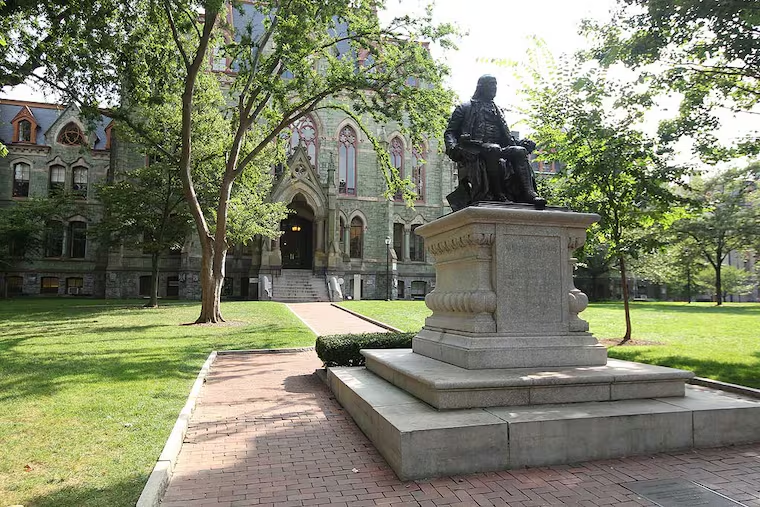Penn’s law and medical schools climb in U.S. News rankings, despite decisions to withdraw from them
Penn Carey Law rose from number six to number four, while Penn’s Perelman School of Medicine was ranked as the second-best medical school for research, up from a tie for sixth.

The University of Pennsylvania’s law and medical schools both climbed in the latest rankings by U.S. News & World Report, despite the university’s decision to stop submitting data for the controversial process.
Penn Carey Law announced its decision to withdraw in December, joining Harvard and Yale in describing the methodology as flawed — but U.S. News ranked them anyway, using publicly available data.
Penn’s Perelman School of Medicine did not announce its withdrawal until January, after it had already submitted its latest data to U.S. News, so its new rank as the second-best school for research is based on a full set of metrics. Yet it is unclear what to make of both new “best” lists, relative to the year before, as U.S. News changed its methodology for both in response to criticism.
Penn Carey Law rose from No. 6 last year to No. 4 in a preview of rankings released this week; it’s tied with Harvard. Yale maintained its No. 1 spot, in a tie with Stanford.
» READ MORE: Penn Carey Law will not submit data for U.S. News rankings
Penn and other prominent law schools said the U.S. News rankings failed to take into account the schools’ strengths in public-interest lawyering. In the case of the medical schools, Penn and other prominent institutions said the U.S. News rankings focused too heavily on grades and test scores, and failed to measure empathy, creativity, and other qualities that make someone a good doctor.
In announcing both the preliminary law and medical school rankings this week, the news magazine noted that it did make changes in methodology, focusing on student outcomes and career opportunities as families become increasingly concerned about costs. The magazine promised more details when full rankings are released next week.
“While we await the final rankings and more information on the methodology to be released on April 18, we are gratified to see that U.S. News considered collective feedback and modified its rankings this year, and that our strong, positive student outcomes are reflected in their ranking released today,” Penn Carey Law said in a statement.
» READ MORE: Penn’s med school is withdrawing from U.S. News rankings, joining Harvard, Stanford, and Columbia
The magazine explained that it chose to rank law schools using only metrics that the schools are required to disclose through the American Bar Association. As a result, the magazine said it dropped some measures it previously used that are not publicly available, such as expenditures and employment rate at graduation.
U.S. News rankings in recent years have come under criticism for their methodology and have been spotlighted in cases in which schools have been accused of providing false data. Last year, Moshe Porat, the former dean of Temple University’s business school, was sentenced to 14 months in federal prison for his role in a scheme to lie to boost the school’s ranking. And Rutgers University’s business school in lawsuits last spring was accused of submitting false statistics to U.S. News, allegations it has denied.
Then, last fall, some prominent universities began to publicly question the methods the magazine was using for some of its most-watched graduate school rankings.
Yale was the first to announce its withdrawal from the law school rankings last November. Harvard followed with its announcement later that same day. Both said the survey methodology made it more difficult for the schools to attract low-income students.
Heather K. Gerken, dean of Yale’s Law School, which for years has ranked No. 1, called the rankings “profoundly flawed.” She said “they disincentivize programs that support public interest careers, champion need-based aid, and welcome working-class students into the profession.”
Penn at that time said it would evaluate the rankings; two weeks later, it, too, said it would pull out.
“The current U.S. News ranking methodology is unnecessarily secretive and contrary to important parts of our mission, including Penn Carey Law’s increasing investment in need-based financial aid and public interest lawyering,” the school said in a statement at the time. “We have directly and frankly shared these concerns with U.S. News and hope they will consider significant and meaningful changes in how data is calculated and published.”
This week, U.S. News noted several changes it made in calculating law school rankings, including a “significant increase in the weight of the bar passage rate,” “a significant increase in weight of employment 10 months after graduation,” “full credit for all full-time, long-term fellowships” and “a significant reduction in overall weights of reputation surveys.”
It also made adjustments in medical school rankings. The magazine noted the “addition of NIH Grant Awards as a measure of research quality,” “an increase in the weight of faculty/student ratios,” “a reduction in overall weights of reputation surveys” and “a reduction in MCAT and GPA scores.”